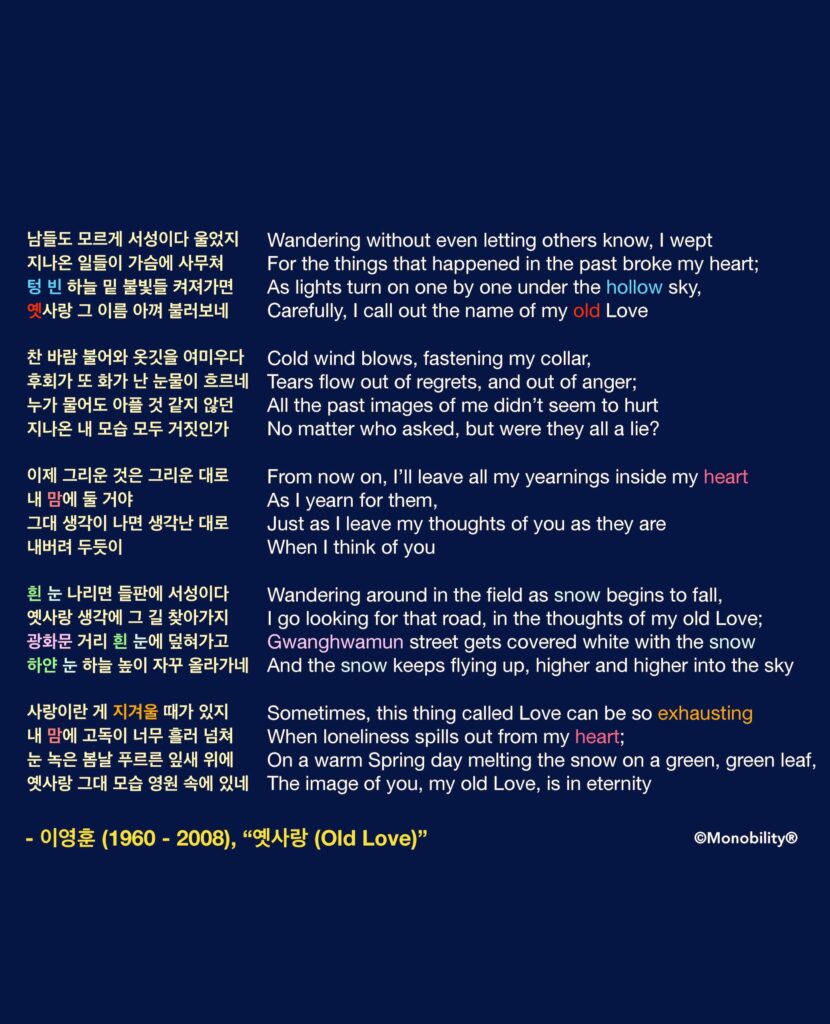I heard that it snowed in Seoul over the weekend. Here in the Iberian peninsula, snow is a rare commodity, enjoyed only in the inland, mountainous areas. Without the real snow available here, I somehow picked up a new habit of listening to a song – “옛사랑 (Old Love),” sung by 이문세, whenever I miss those snowflakes. It’s pretty much the only thing I can do for now to “feel” like it’s snowing, whether it’s from the sky, or from my heart. And this time, I even translated the poetic lyrics by 이영훈, who “modernized” the Korean pop back in the 1990’s. It’s not a simple task to translate poems and poetic lyrics, but I happened to notice that most translations of Korean contents found online these days, including streaming K-Drama services like Netflix, are careless, faulty, or misleading. And not many people are able to point them out. So I did it anyway. That way, you might enjoy more out of this famous song, still sung and loved by many people in Korea, just as 김선호 and 신민아 in “갯마을 차차차 (Hometown Cha-Cha-Cha, 2021).”
- Title – “옛”사랑
옛 works as a prefix, and it means “past”, therefore, “old”.
- 옛날 = 옛 + 날 (day) = old day = the past
- 옛노래 = 옛 + 노래 (song) = old song
“옛”사랑 is not a common expression in Korean. It’s rather a poetic coinage, meaning “love that happened in the past,” therefore, “old love.” It doesn’t mean you are old. The love is old, and happened long ago. Given its poetic subliminal message as a title, it is better translated as “Old Love” than “Past Love.”
- Meter
Did you know that 맘 means exactly the same as 마음 in spoken Korean? 마음 is one of the most popular words in Korean vocabulary, and it’s not easily translatable. It means “heart”, “mind”, or even “spirit, will,” depending on the context. 맘 is a contraction (simpler form) of 마음 in everyday speech. Just as 흰 means exactly the same as 하얀 (white), as marked in the lyrics below.
You may have noticed that most lines except the 3rd stanza have about 12 syllabic meter, sometimes 11 or 13. It looks similar to classical French alexandrine, but not as strict. Evidently the composer/lyricist selectively used the contractions to keep the meter as consistent as possible.
- Melody
For the entire song, the simple but haunting melody repeatedly goes higher and higher, and ends with the highest note on every other line. Just like the music is visualizing the last words in the 4th stanza – “하얀 눈 하늘 높이 자꾸 올라가네 (The snow keeps flying up, higher and higher into the sky).” Did you ever see light, dry snow actually fly up, instead of falling down, when it’s windy? It can and it often does. Amazing congruity between the melody and the lyrics.
What do you think the “snow” symbolizes in this song?
- Korean Lyricism
And still, I believe that the quintessence of this song is in the final, the fifth stanza, as the ancient Greeks would call it as “the fifth element.” After a rhythm-breaking, extended pause in tenuto, like a sigh, the timelessly unbeatable singer 이문세 utters the ultimate keyword “사랑.” And to the audience’s surprise, instead of usual, typical and predictable words glorifying “love,” he quietly sings “사랑이란 게 지겨울 때가 있지 (Sometimes, this thing called Love can be so exhausting).” What a fresh, shocking statement in a love song, back in the 1990’s. Literally, the line in Korean means “There are times when I get sick and tired of the thing called Love.”
- 지겹다 to be sick and tired of …
- 난 이 일이 지겨워! I am sick and tired of this work!
And the next three lines explain why. In his inner, hollow (“텅빈”) solitude, he has been missing his old love to the extent that he even got sick and tired of it. To fully understand this, one must read between the lines. It’s like when your loved one speaks quite the contrary to what his or her eyes tell you – the truth. Words say one thing, but actually eyes speak louder. And when you find such truth, sublimation follows, as this final stanza ends with “eternity.” These lines are essentially the epitome of what I would call “Korean lyricism,” which constantly appears in classical Korean poems, literature, and songs: with simple transparency, it evokes subliminal emotional sensibility telling the sentimental truth contrary to loudly spoken or written words, inspiring innocence, peace, and above all, warmth, whispered in your ear in a low but elegant voice. And in this fine song, the voice comes from the great songwriter 이영훈 (1960 – 2008), perfectly interpreted by the timeless and ageless top singer 이문세.

Check out our Facebook for much more:



